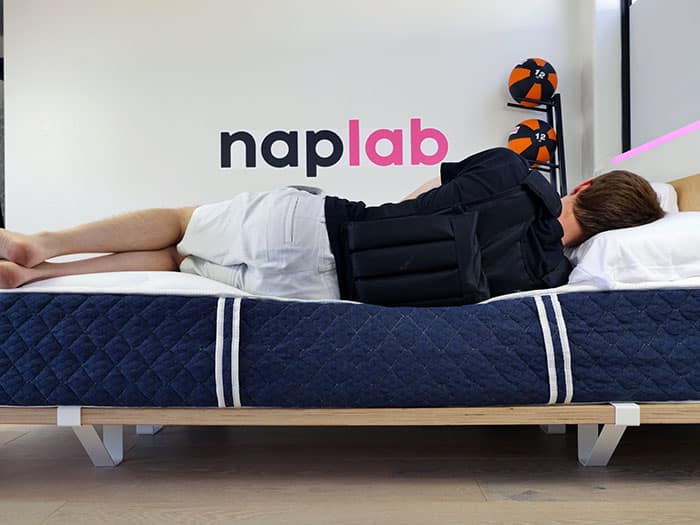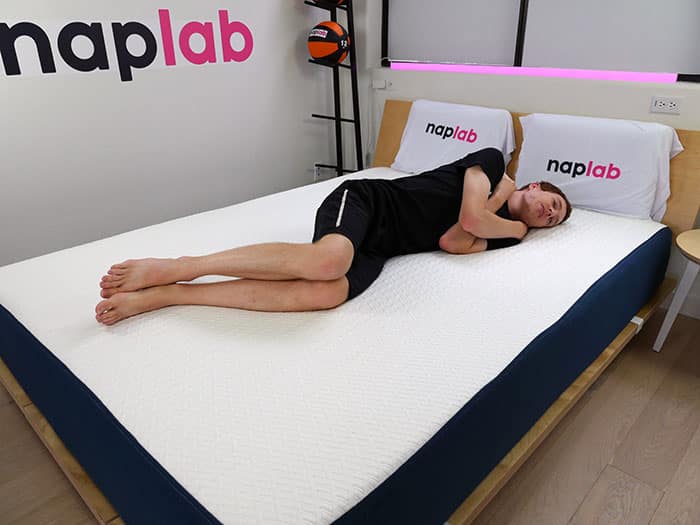Some people can fall asleep just about anywhere — on planes, in traffic, or on a bench in the park. Meanwhile, you’re counting sheep or staring at the ceiling while lying comfortably in your bed.

The truth is, what you do throughout the day can affect your ability to fall asleep. Many times, we’re so busy during the day that our brains don’t have time to digest information and engage in reflection.
These thoughts pop up at night when the brain is free to process emotions, experiences, and random facts.
Luckily, there are a couple of things you can do to fall asleep faster. For starters, try these strategies:
How can I fall asleep in 5 minutes?
If you’ve ever tried meditation, you know that deep breathing can help your mind and body relax.
Try Breath Focus.
Breath focus allows you to turn off distracting thoughts and sensations while reducing stress. This might be exactly what you need to quiet your mind before bedtime and fall asleep faster.

The Arizona Center for Integrative Medicine recommends a simple breathing exercise called the 4-7-8 sleeping method that promotes relaxation and wards off stress. Simply follow these steps:
What is the 4-7-8 sleeping method?
- Sit or lie down with your back straight.
- Place the tip of your tongue against the gums behind your upper front teeth.
- Exhale all the air from your lungs through your mouth.
- Close your mouth while taking a deep breath through your nose for a count of four.
- Hold your breath while counting to seven.
- Exhale through your mouth for a count of eight.
- Start again and repeat three more times.
The 4-7-8 breathing method calms the nervous system and turns off the stress response. This technique becomes even more effective over time.
Practice at least twice a day—not just before bedtime—to fully reap the benefits.
How can I fall asleep instantly?
Soldiers are often forced to live in harsh environments for months or years. Many times, they sleep on the floor or in bunk beds at extreme temperatures.
Despite these challenges, they’re able to fall asleep quickly and get enough shuteye.

Try the military relaxation technique.
INC shares a relaxation technique that is purportedly used by military personnel. Here’s what it looks like:
- Relax your tongue and facial muscles while lying in bed.
- Let your shoulders fall and relax.
- Exhale while relaxing your chest and legs.
- Clear your mind for about 10 seconds and then try to visualize a calming scene, like floating in a boat on a lake.
This technique combines progressive muscle relaxation, guided imagery, and breath control. All three methods are commonly used to elicit a relaxation response, lower stress levels, and reduce anxiety.
The above exercise may not work from day one, but it becomes more effective with regular practice, says INC.
Our advice is to give it a try. Even if you don’t fall asleep in minutes, you may still feel calmer and more relaxed, which could lead to a better night’s rest.
Why can I not sleep at night?
You’ve probably heard that blue light affects your body’s internal clock, making it difficult to fall asleep. However, it’s not just the blue light that may cause these issues.
Artificial light has similar effects, notes WebMD. Exposure to indoor light before bedtime suppresses the production of melatonin, a hormone that regulates sleep.

In addition to its role in the sleep-wake cycle, melatonin contributes to bone formation, immune function, and heart health. It also regulates your metabolism and reproductive function, reports a 2017 review published in Current Neuropharmacology.
What this means is that exposure to artificial light before bedtime can affect overall health. As WebMD points out, melatonin suppression may increase the risk of cancer and diabetes, among other side effects.

To mitigate these risks, try to only use your bedroom for sleep. Avoid watching TV, using your laptop, or browsing your smartphone before bedtime.
If you can’t fall asleep right away, try the relaxation techniques listed above or read a book in dim light. The latter option isn’t ideal, but it’s still better than looking at a screen.
What is the fastest way of sleeping?
One of the best ways to fall asleep faster is to boost your melatonin production. Here are a few strategies you can try to boost your levels.
Use these strategies to sleep faster—and better:
- Try to get some sun in the morning. Sunlight boosts the release of serotonin, a precursor of melatonin.
- Take a warm bath or shower before bedtime to bring down cortisol levels. Cortisol, the stress hormone, affects melatonin production. A warm bath can relax your mind and body, leading to better sleep.
- Avoid caffeinated beverages after 2 or 3 P.M. Caffeine’s half-life is about five hours. This means that if you drink a cup of coffee at 4 or 5 P.M., you’ll still have caffeine in your system at 10 PM. This stimulant interferes with melatonin production, making it harder to fall asleep.

- Make a habit out of meditating in the evening. Meditation calms your mind, which in turn may increase melatonin levels.
- Commit to regular exercise, even if it’s just for 15 or 20 minutes at a time. Physical activity causes an increase in melatonin production 12 to 24 hours later. Evening workouts suppress melatonin secretion, so it’s better to exercise earlier in the day.
- Lavender essential oil can naturally boost melatonin levels. To reap the benefits, place dried lavender sachets on your bed or sleep on a lavender pillow. Another option is to use essential oil diffusers or lavender incense sticks.
Consider Melatonin Supplements
As discussed above, melatonin is a naturally occurring hormone with numerous health benefits. Depending on your needs, you can obtain it from food, supplements, or both.
Melatonin supplements are generally safe for short-term use, according to the National Center for Complementary and Integrative Health (NCCIH). Unlike sleeping pills, they’re less likely to cause addiction.

The NCCIH recommends these supplements for jet lag, difficulty sleeping, anxiety before surgery, and certain sleep disorders in children. They may also help with delayed sleep-wake phase disorder (DSWPD), a condition that makes it hard to fall asleep at bedtime and wake up in the morning.
- For example, a 2016 study found that melatonin supplements reduced the time it took for people with DSWPD to fall asleep by 22 minutes, reports the NCCIH.
- In another study, those who took melatonin one hour before the desired bedtime fell asleep 34 minutes earlier than usual and had a better night’s rest.
As a general rule, you should talk with your doctor before using melatonin supplements if you have epilepsy or take blood thinners.
Also, note that supplemental melatonin may not be safe for people with dementia and can cause daytime drowsiness in older adults.
How can I sleep better at night naturally?
Another method to get better sleep and avoid sleep deprivation is to watch the foods that you’re eating.
Some foods can naturally increase melatonin production and help you fall asleep faster. Others, such as beef, salmon, chicken, eggs, and whole grains contain small amounts of melatonin, reports a 2017 review published in the journal Nutrients.
This compound can also be found in cherries, strawberries, cranberries, purslane, and some veggies. Green cardamom, fennel, alfalfa, and other spices are rich in melatonin, too.

Let’s see other foods that either contain this nutrient or can help your body produce more of it:
- Pistachios
- Almonds
- Green beans
- Roasted beans
- Tart cherries
- Pineapple
- Cow’s milk
- Turkey
- Pork
- Rice
- Oats
Pork and other fatty foods are not ideal for dinner, but you can reach for a handful of cherries or almonds before bedtime. Milk is a good choice, too. See our guide on what you eat at night for inspiration.
These foods may or may not help you fall asleep faster, but it’s something worth trying. Many of these products are loaded with healthy fats, protein, vitamins, and other nutrients that support optimal health.

Turkey, for example, is rich in tryptophan, an amino acid that may improve sleep quality and sleep latency (the amount of time it takes to fall asleep). This nutrient also occurs naturally in pumpkin seeds and other whole foods.
Researchers recommend eating about 10.5 ounces of turkey or 7 ounces of pumpkin seeds throughout the day to boost your tryptophan intake.
How can I fall asleep faster in 2 minutes?
If you want to fall asleep faster, take some mental notes of the environment that you’re trying to fall asleep in. Is it working FOR you or AGAINST you?
A high room temperature, bright light, loud noises, and other environmental factors can affect your ability to fall and stay asleep.
That’s why it’s important to soundproof your room and take the steps needed to create a comfortable sleep environment.

Here is a handful of tips for creating an environment more conducive to better sleep.
- For starters, lower the thermostat at night. The temperature in your bedroom should not exceed 60 to 67 degrees Fahrenheit. If you don’t feel comfortable sleeping in a colder bedroom, put a hot water bottle at your feet or wear socks during the night.
- You may also want to use shades to keep your bedroom dark. If that’s not an option, consider wearing an eye mask during sleep.
- Choose a comfortable mattress and bed linens made from breathable materials. Take into your account your sleep position when shopping for a new mattress. For example, if you sleep on your side, look for medium-firm memory foam mattresses to ensure proper spine alignment during sleep.
- Declutter your bedroom to minimize distractions and feel more relaxed at bedtime. Again, our advice is to use your bedroom for sleep only. Move your desk, TV, and other items to another room.
- Consider painting your bedroom in a different color. A British study reports that blue, silver, and certain shades of green and yellow promote a better night’s sleep. The color blue, for example, induces feelings of calmness and may help lower your heart rate, making it easier to relax at bedtime.
Note that some types of noise are beneficial.
White noise, for instance, can mask environmental noise and lead to better sleep. As an example, think about nature sounds, such as rainfall, birds chirping, or ocean waves.
Yoga Bedtime Routine
As you probably know, yoga promotes relaxation and may decrease stress. Considering these aspects, it’s not surprising that it could help you sleep faster and better.
A 2014 study found that yoga may improve sleep quality, efficiency, and duration in older adults with insomnia. Subjects who practiced yoga also fell asleep faster and reported less fatigue, stress, and anxiety.
Other types of exercise can be just as beneficial.

In a clinical trial, moderate-intensity cardiovascular exercise, such as treadmill walking, reduced time to fall asleep by 55% in chronic insomnia patients. Moreover, it increased sleep duration and efficiency while decreasing anxiety.
Yoga, however, is a better choice than cardiovascular or strength training before bedtime due to its calming effects.
Aerobic exercise and strength training cause a temporary increase in the stress hormone cortisol levels. That’s why most health experts recommend working out at least three to four hours before time.
Depending on your schedule, you may exercise in the morning or afternoon and practice yoga before bedtime. Try the waterfall pose, the child’s pose, the corpse pose, or the reclined butterfly. Generally, restorative yoga is the best option before bedtime.
How do I shut my brain off at night?
These are just a few of the many things you can do to fall asleep faster.
Implement our tips and focus on creating a bedtime routine that works for you. Avoid alcohol, nicotine, caffeine, spicy foods, and heavy or fatty meals before bed, as they may interfere with your sleep.
Take the steps needed to calm down at bedtime. Remember, stress is your worst enemy.
Try to practice guided meditation, yoga, and other relaxation techniques to prepare your mind and body for sleep. You could even take a short walk around the house before bedtime to relax your senses.

Now that you know how to sleep faster, make these changes to your bedtime routine. Consider starting a journal or wear an activity tracker that monitors your sleep.
Meanwhile, check out our guide on how to fix your sleep schedule. We’ll show you the exact steps you should take to fall asleep faster, wake up earlier, and feel more energized throughout the day.
FAQ
Focus on intentionally slowed breathing. Close your eyes and turn down the lights. Try practicing mindful meditation or visualization exercises. All of these strategies help your body prepare for sleep and discourage racing thoughts from the day.
1. Close your mouth while taking a deep breath through your nose for a count of four.
2. Hold your breath while counting to seven.
3. Exhale through your mouth for a count of eight.
Repeat this technique as needed. This breathing method helps to calm the nervous system and turns off the stress response.
No alcohol or food 3 hours before bed.
No more work 2 hours before bed.
No digital screens (phones, computer, TV) 1 hour before bed.
Citations
- Biofeedback exercises for Stress 2 – Council of Emergency … (n.d.). Retrieved October 15, 2021, from https://www.cordem.org/globalassets/files/academic-assembly/2017-aa/handouts/day-three/biofeedback-exercises-for-stress-2—fernances-j.pdf.
- Blue Light has a dark side. Harvard Health. (2020, July 7). Retrieved October 15, 2021, from https://www.health.harvard.edu/staying-healthy/blue-light-has-a-dark-side.
- Brent A. Bauer, M. D. (2020, November 13). Pros and cons of Melatonin. Mayo Clinic. Retrieved October 15, 2021, from https://www.mayoclinic.org/healthy-lifestyle/adult-health/expert-answers/melatonin-side-effects/faq-20057874.
- E;, B. O. M. L. H.-B. M. H. U. C. (n.d.). Acute and delayed effects of exercise on human melatonin secretion. Journal of biological rhythms. Retrieved October 15, 2021, from https://pubmed.ncbi.nlm.nih.gov/9406031/.
- Halpern J;Cohen M;Kennedy G;Reece J;Cahan C;Baharav A; (n.d.). Yoga for improving sleep quality and quality of life for older adults. Alternative therapies in health and medicine. Retrieved October 15, 2021, from https://pubmed.ncbi.nlm.nih.gov/24755569/.
- Halson, S. L. (2014, May). Sleep in elite athletes and nutritional interventions to enhance sleep. Sports medicine (Auckland, N.Z.). Retrieved October 15, 2021, from https://www.ncbi.nlm.nih.gov/pmc/articles/PMC4008810/.
- Hendrick, B. (2011, January 19). Light exposure may cut production of melatonin. WebMD. Retrieved October 15, 2021, from https://www.webmd.com/sleep-disorders/news/20110119/light-exposure-may-cut-production-of-melatonin.
- MediLexicon International. (n.d.). How long does caffeine stay in your system? metabolism and more. Medical News Today. Retrieved October 15, 2021, from https://www.medicalnewstoday.com/articles/321784.
- Meng, X., Li, Y., Li, S., Zhou, Y., Gan, R.-Y., Xu, D.-P., & Li, H.-B. (2017, April 7). Dietary sources and bioactivities of Melatonin. Nutrients. Retrieved October 15, 2021, from https://www.ncbi.nlm.nih.gov/pmc/articles/PMC5409706/.
- Nall, R. (2019, April 1). What are the benefits of sunlight? Healthline. Retrieved October 15, 2021, from https://www.healthline.com/health/depression/benefits-sunlight#_noHeaderPrefixedContent.
- Passos GS;Poyares D;Santana MG;Garbuio SA;Tufik S;Mello MT; (n.d.). Effect of acute physical exercise on patients with chronic primary insomnia. Journal of clinical sleep medicine : JCSM : official publication of the American Academy of Sleep Medicine. Retrieved October 15, 2021, from https://pubmed.ncbi.nlm.nih.gov/20572421/.
- Relaxation techniques: Breath control helps quell errant stress response. Harvard Health. (2020, July 6). Retrieved October 15, 2021, from https://www.health.harvard.edu/mind-and-mood/relaxation-techniques-breath-control-helps-quell-errant-stress-response.
- The secret to a good night’s slumber is to sleep in a blue bedroom. Travelodge. (2013, May 17). Retrieved October 15, 2021, from https://www.travelodge.co.uk/press-centre/press-releases/SECRET-GOOD-NIGHT%E2%80%99S-SLUMBER-SLEEP-BLUE-BEDROOM.
- Stevens, E. C. (2017, November 7). What the heck is restorative yoga and why should I do it? Breaking Muscle. Retrieved October 15, 2021, from https://breakingmuscle.com/fitness/what-the-heck-is-restorative-yoga-and-why-should-i-do-it.
- Stillman, J. (2018, November 5). The trick soldiers use to fall asleep in minutes in even the most uncomfortable situations. Inc.com. Retrieved October 15, 2021, from https://www.inc.com/jessica-stillman/the-trick-soldiers-use-to-fall-asleep-in-minutes-in-even-most-uncomfortable-situations.html.
- Team, F. H. (2020, October 9). What is the ideal sleeping temperature for my bedroom? Cleveland Clinic. Retrieved October 15, 2021, from https://health.clevelandclinic.org/what-is-the-ideal-sleeping-temperature-for-my-bedroom/.
- Tooley, G. A., Armstrong, S. M., Norman, T. R., & Sali, A. (2000, June 26). Acute increases in night-time plasma melatonin levels following a period of meditation. Biological Psychology. Retrieved October 15, 2021, from https://www.sciencedirect.com/science/article/abs/pii/S0301051100000351.
- Tordjman, S., Chokron, S., Delorme, R., Charrier, A., Bellissant, E., Jaafari, N., & Fougerou, C. (2017, April). Melatonin: Pharmacology, functions and therapeutic benefits. Current neuropharmacology. Retrieved October 15, 2021, from https://www.ncbi.nlm.nih.gov/pmc/articles/PMC5405617/.
- U.S. Department of Health and Human Services. (n.d.). Melatonin: What you need to know. National Center for Complementary and Integrative Health. Retrieved October 15, 2021, from https://www.nccih.nih.gov/health/melatonin-what-you-need-to-know.
- Velasco-Rodríguez R;Pérez-Hernández MG;Maturano-Melgoza JA;Hilerio-López ÁG;Monroy-Rojas A;Arana-Gómez B;Vásquez C; (n.d.). The effect of aromatherapy with lavender (Lavandula angustifolia) on serum melatonin levels. Complementary therapies in medicine. Retrieved October 15, 2021, from https://pubmed.ncbi.nlm.nih.gov/31780012/.



